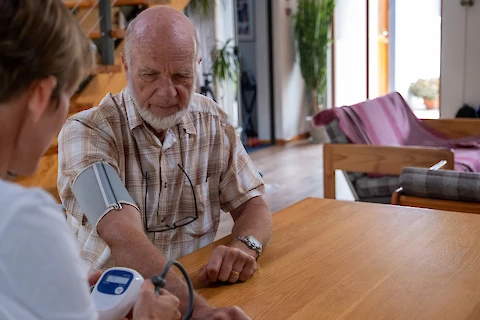
As we welcome February, we also recognize it as American Heart Month, a time to place a spotlight on heart health and cardiovascular disease prevention, especially for our senior population. If you are a caregiver for an older family member, understanding how to measure their blood pressure accurately can play a critical role in preserving their heart health. Blood pressure readings, while seemingly simple, can provide valuable insight, helping to identify potential health issues before they become serious.
What Is Blood Pressure Reading?
Blood pressure is a crucial health indicator that displays the force exerted on the walls of arteries as the heart pumps blood. It's represented by two numbers: the systolic pressure (upper number), which represents the pressure when the heart beats, and the diastolic pressure (lower number), measuring the pressure when the heart rests between beats. Seniors typically have a normal blood pressure range of less than 120/80 mmHg. Consistent readings above this range may suggest hypertension, while readings significantly below might indicate low blood pressure, each carrying potential health risks for seniors.
How to Accurately Measure Seniors' Blood Pressure
To measure a senior's blood pressure accurately, using an automated blood pressure monitor is ideal. Before commencing, ensure the senior is relaxed and has refrained from consuming caffeine or alcohol or exercising for at least 30 minutes. Have them seated comfortably with their feet flat on the floor and their back supported. Put the cuff on their upper arm, making sure it's snug but not tight. The bottom of the cuff should be placed above the elbow crease. Once everything is in place, simply press the “start” button on the automated monitor.
Interpreting Blood Pressure Readings
Understanding what different blood pressure readings mean is crucial. Readings below 120/80 mmHg are considered normal, while readings consistently between 120 and 129/80 mmHg are elevated. Hypertension begins at 130/80 mmHg. Blood pressure consistently below 90/60 mmHg may denote low blood pressure. It's important to keep a keen eye on these measurements, as abnormal readings may require medical attention. Regular blood pressure checks are crucial for seniors to help detect any potential health problems early.
What to Do With the Information
After obtaining blood pressure readings, it's essential to record them accurately, noting the date and time. This allows you to spot any trends or sudden changes. If the readings consistently fall outside the normal range, it's advisable to contact the senior’s healthcare provider promptly. In addition to monitoring blood pressure, consider recommending lifestyle changes that can help regulate blood pressure, such as a balanced diet, regular exercise, and stress reduction techniques.
Senior Helpers Corpus Christi Helps Seniors Monitor Their Blood Pressure
Taking an active role in monitoring your senior family members' blood pressure can significantly contribute to their overall heart health, especially as we mark American Heart Month. We understand the challenges and responsibilities that come with caregiving, and that's why our team at Senior Helpers Corpus Christi is committed to providing the support you need. For residents of Corpus Christi, Rockport, Port Aransas, and the surrounding areas, we are ready to offer personalized, professional in-home care services tailored to meet your senior family members' unique needs. Take the first step towards maintaining healthy hearts by reaching out to us today. Your loved ones' heart health is our priority.